“Most people think the character I do onstage is the way I am offstage, but I’m just a regular guy who spends time with his family and who turns on the television and watches a lot of sports.”
~ Don Rickles
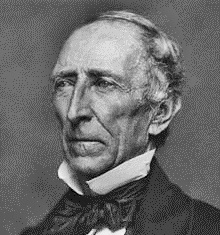
1841– Vice president John Tyler, suddenly thrust into the role of president when William Henry Harrison died just one month after his inauguration, was sworn in.
Tyler was the first vice president to immediately assume the role of president after a sitting president’s untimely exit and set the precedent for succession thereafter.
His four years in office were contentious, to say the least. Tyler was a proponent of states’ rights and the perpetuation of slavery, and as such was a threat to his own political party, the Whigs, who advocated a strong federal system.
When Tyler vetoed his fellow Whigs’ attempt to reestablish the National Bank, most of his cabinet resigned and he was thrown out of the Whig Party. As he had previously alienated the support of the Democrats by denouncing Andrew Jackson’s policies, Tyler became a president without a party who received numerous death threats from both sides and earned the enmity of Congress.

1862– Union General Ulysses S. Grant and Confederate General Albert Sidney Johnston collided at Shiloh, near Pittsburgh Landing in Tennessee.
The Battle of Shiloh became one of the bloodiest engagements of the war, and the level of violence shocked North and South alike.
Grant brought his army, 42,000 strong, to rendezvous with General Don Carlos Buell and his 20,000 troops. Grant’s objective was Corinth, Mississippi, a vital rail center that if captured would give the Union total control of the region. Twenty miles away, Johnston lurked at Corinth with 45,000 soldiers.
In the early dawn of April 6, a Yankee patrol found the Confederates poised for battle just a mile from the main Union army. Johnston attacked, driving the surprised Union troops back near a small church called Shiloh (meaning place of peace).
Throughout the day, the Confederates battered the Union army, driving it back towards Pittsburgh Landing and threatening to trap it against the Tennessee River. Many troops on both sides had no experience in battle.
In the middle of the afternoon, Johnston rode forward to direct the Confederate attack and was struck in the leg by a bullet, severing an artery and causing him to quickly bleed to death. He became the highest ranking general on either side killed during the war.
General Pierre G. T. Beauregard assumed control, and he halted the advance at nightfall. The Union army was driven back two miles, but it did not break.
The arrival of additional troops from Buell’s army provided Grant with reinforcements, while the Confederates were worn out from their march. The next day, Grant pushed the Confederates back to Corinth for a major Union victory.
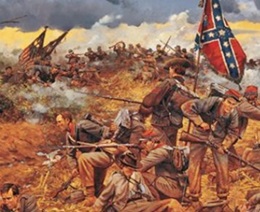
1865– The Confederate Army of Northern Virginia, commanded by General Robert E. Lee and the Union Army under the overall direction of Union General-in-Chief Lieutenant General Ulysses S. Grant, met at the Battle of Sayler’s Creek near Farmville, VA.
After abandoning Petersburg, the exhausted and starving Confederates had headed west, hoping to re-supply at Danville or Lynchburg, before heading to North Carolina. But the stronger Union army kept pace with them, exploiting the rough terrain full of creeks and high bluffs, where the Confederates’ long wagon trains were highly vulnerable.
The Union overwhelmed the Confederates, capturing 7,700 men and depriving Lee of roughly one-fourth of his army.
The end was very near.

1896– The first modern Olympic Games were held in Athens, Greece, with athletes from 14 countries participating.
241 male athletes (and no women) representing 14 nations competed in 43 events.
America’s James Connolly (shown above) became the first modern Olympic champion when he won the triple jump on the opening day of the Games.
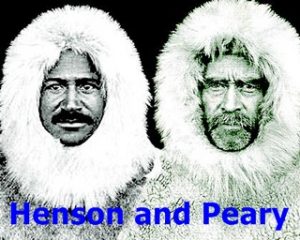
1909– American explorer Robert Peary accomplished a long elusive dream when he, along with assistant Matthew Henson and four Eskimos, reached what they determined to be the North Pole.
Although their achievement was widely acclaimed, Dr. Frederick A. Cook challenged their distinction of being the first to reach the North Pole. A former associate of Peary, Cook claimed he had already reached the pole by dogsled the previous year. A major controversy followed, and in 1911 the U.S. Congress formally recognized Peary’s claim.
In recent years, further studies of the conflicting claims suggest that neither expedition reached the exact North Pole, but that Peary and Henson came much closer, falling perhaps 30 miles short.
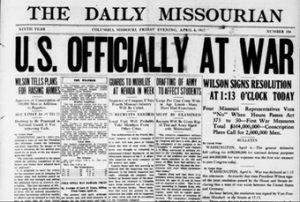
1917– Two days after the U.S. Senate voted 82 to 6 to declare war against Germany, the U.S. House of Representatives endorsed the declaration by a vote of 373 to 50, and America formally entered World War I.
When World War I erupted in 1914, President Woodrow Wilson had pledged neutrality for the United States, a position that the vast majority of Americans favored. Britain, however, was one of America’s closest trading partners, and tension soon arose between the United States and Germany over the latter’s attempted quarantine of the British Isles.
In March 1915, a German cruiser sank the William P. Frye, a private American vessel. The German government apologized and called the attack an unfortunate mistake.
Two months later, the British-owned Lusitania ocean liner was torpedoed without warning just off the coast of Ireland. Of the 1,959 passengers, 1,198 were killed, including 128 Americans.
In August, Germany again pledged to see to the safety of passengers before sinking unarmed vessels, but in November sunk an Italian liner without warning, killing 272 people, including 27 Americans. With these attacks, public opinion in the United States began to turn irrevocably against Germany.
In 1917, Germany announced the resumption of unrestricted warfare in war-zone waters. Three days later, the United States broke diplomatic relations with Germany, and just hours after that, the American liner Housatonic was sunk by a German U-boat.
In late March, Germany sunk four more U.S. merchant ships, and on April 2 President Wilson appeared before Congress and called for a declaration of war against Germany. Four days later, his request was granted.

1963 – The Kingsmen recorded Louie Louie at Northwestern, Inc., Motion Pictures and Recording in Portland, Oregon. The session cost $50 and the band recorded the song – mistakes and all – in one take.
The Kingsmen transformed songwriter Richard Berry’s easy-going ballad into a raucous romp, complete with a twangy guitar, occasional background chatter, and nearly unintelligible lyrics by lead singer Jack Ely.
The famous guitar break was triggered by the shout, “Okay, let’s give it to ’em right now!,” and music critic Dave Marsh suggests it was that moment that gave the recording its everlasting greatness.
“Ely went for it so avidly you’d have thought he’d spotted the jugular of a lifelong enemy, and so crudely that, at that instant, Ely sounds like Donald Duck on helium. And it’s that faintly ridiculous air that makes the Kingsmen’s record the classic that it is, especially since it’s followed by a guitar solo that’s just as wacky.”
Another factor in the success of the record may have been the rumor that the lyrics were intentionally slurred by the Kingsmen to cover up the alleged fact that the lyrics were laced with profanity.
The song was banned on many radio stations and in many places in the United States, including Indiana, where it was personally prohibited by Governor Matthew Welsh.
The FBI – with apparently nothing better to do – started a 31-month investigation into the matter and concluded they were “unable to interpret any of the wording in the record.”
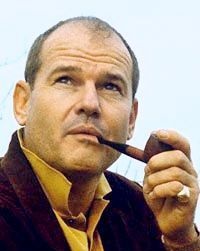
1970– Sam Sheppard, a doctor convicted of murdering his pregnant wife in a trial that caused a media frenzy in the 1950s, died of liver failure. After a decade in prison, Sheppard was released following a re-trial.

1973– Ron Blomberg of the American League New York Yankees became the first designated hitter in Major League Baseball history, facing Boston Red Sox pitcher Luis Tiant in his first plate appearance.
Blomberg walked with the bases loaded, forcing in a run and sending his bat to Cooperstown.
The National League held a yes/no vote on August 13, 1980, to determine whether or not that league would adopt the designated hitter rule. The motion failed and the league has never voted on it again.
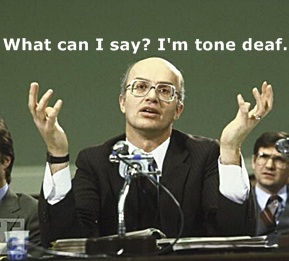
1983– Interior Secretary James Watt banned the Beach Boys from the 4th of July celebration on the Washington Mall, saying rock and roll bands attracted the “wrong element.”
The Beach Boys stated that the Soviet Union, which had invited them to perform in Leningrad in 1978, “obviously… did not feel the group attracted the wrong element.”
Watt apologized to The Beach Boys after learning that President Reagan and First Lady Nancy Reagan were fans of the band.
Watt’s Beach Boys gaffe was hardly an isolated example of his idiotic nature. He seemed to have little concern for the environment – odd, considering his position – when he made these bizarre quotes:
“We will mine more, drill more, cut more timber.”
“If the troubles from environmentalists cannot be solved in the jury box or at the ballot box, perhaps the cartridge box should be used.”
Watt resigned his position eighteen days after a hideous quote about the makeup of his staff.
“We have every kind of mix you can have. I have a black, I have a woman, two Jews and a cripple.”

1987– During an interview on ABCs Nightline, Los Angeles Dodgers general manager Al Campanis was asked by anchorman Ted Koppel, why – at the time – there had been few black managers and no black general managers in Major League Baseball.
Campanis’ reply was that blacks “may not have some of the necessities to be, let’s say, a field manager, or, perhaps, a general manager” for these positions.
Elsewhere in the interview, he said that blacks are often poor swimmers “because they don’t have the buoyancy.”
Campanis was fired less than 48 hours later.

1998– Singer Tammy Wynette died from cardiac arrhythmia at the age of 55.
The “First Lady of Country Music” recorded twenty #1 country music hits, including Stand By Your Man, D-I-V-O-R-C-E, and I Don’t Wanna Play House.
Many of her hits dealt with classic themes of loneliness, divorce, and the difficulties of life and relationships.
In a case of life imitating art, Wynette was married five times, once to George Jones. Even after their 1975 divorce (due largely to Jones’ alcoholism), their professional collaboration continued with regularity through 1980.

2014– Actor Mickey Rooney died of natural causes at the age of 93.
The diminutive actor – he was 5′-2″ tall – had a career which spanned 88 years, which included performing the role of Andy Hardy in a series of 15 films in the 1930s and 1940s that epitomized American family values.
At 19 he was the first teenager to be nominated for an Oscar for his leading role in Babes in Arms, and at the peak of his career between the ages of 15 and 25, he made 43 films, which made him one of Metro-Goldwyn-Mayer’s most consistently successful actors.
By the end of the 1940s, however, Rooney’s movie characters were no longer in demand and his career went downhill.
Married eight times, his personal life was a disaster. His longtime gambling habit caused him to “gamble away his fortune again and again.” Despite the millions of dollars he earned over the years, he died nearly destitute.
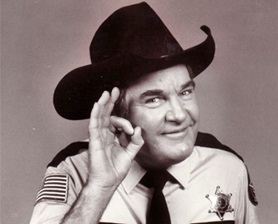
2015– Actor James Best died from complications of pneumonia at the age of 88.
During a career that spanned more than 60 years, he performed in many feature films, including Winchester ’73, The Naked and The Dead, The Cimarron Kid and Hooper, but he will always be best remembered for his role as Sheriff Rosco P. Coltrane on television’s The Dukes of Hazzard.

2016– Country singer Merle Haggard died of cancer on his 79th birthday.
Between the 1960s and the 1980s, he had 38 #1 hits on the Billboard country charts, including Okie From Muskogee, Mama Tried, The Fightin’ Side Of Me.

2017– Comedian Don Rickles died of kidney failure at the age of 90.
Rickles was the ultimate putdown artist, comedy’s unquestioned master of the insult. No one — regardless of gender, ethnicity, sexual orientation, or cultural standing — escaped the vicious taunts of “Mr. Warmth”; even audience members, as well as other celebrities, were fair game for his delirious rages of verbal abuse.
Although he appeared in several comedy movies – primarily in the Frankie Avalon/Annette Funicello beach party movies – Rickles proved he had dramatic skills, as well, appearing in Run Silent, Run Deep, Kelly’s Heroes, and Casino.
He was a frequent guest on The Tonight Show during Johnny Carson’s era, appearing more than 100 times, and he became a fixture on The Dean Martin Celebrity Roast specials, delivering caustic one-liners at the expense of the celebrity being honored.
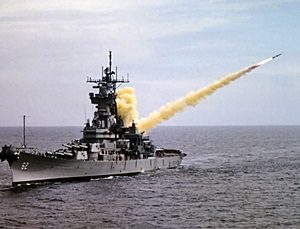
2017– The United States launched 59 Tomahawk cruise missiles from the Mediterranean Sea into Syria, aimed at Shayrat Airbase controlled by the Syrian government.
The strike was executed under responsibility of President Donald Trump, as a direct response to the Khan Shaykhun chemical attack that had occurred on two days earlier.
The strike was conducted without either U.S. congressional or United Nations Security Council approval, although more than two dozen members of Congress were briefed, as were several countries, including Canada, the UK, Australia, and Russia, in advance of the strike.

2018– A bus carrying the Humboldt Broncos junior ice hockey team collided with a semi-trailer truck in Saskatchewan, Canada, killing 16 people and injuring 13 others.
The truck had failed to yield at a flashing stop sign at the intersection of Highways 35 and 335 while traveling at a speed of approximately 60 mph.
The truck driver was later sentenced to 8 years in prison.
Compiled by Ray Lemire ©2019 RayLemire.com / Streamingoldies.com. All Rights Reserved.